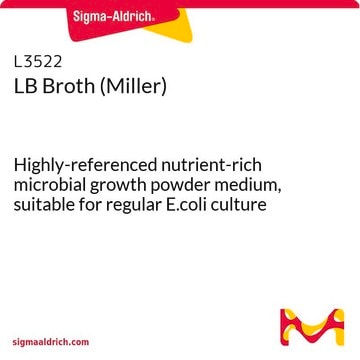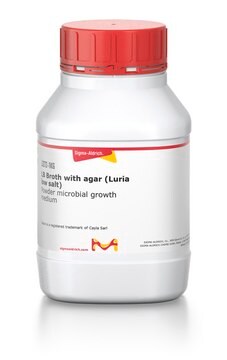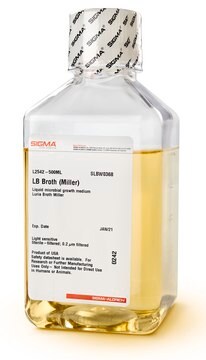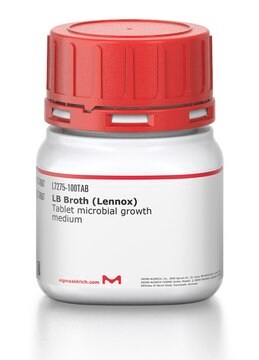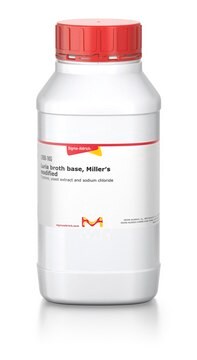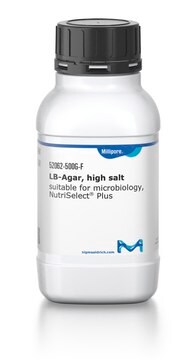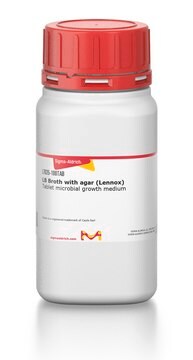L3397
LB Broth (Luria low salt)
Powder microbial growth medium
Synonym(s):
Luria Broth (Miller’s Modification), Luria-Bertani medium (LB)
Sign Into View Organizational & Contract Pricing
All Photos(2)
About This Item
UNSPSC Code:
41106200
NACRES:
NA.85
Recommended Products
grade
Molecular Biology
for molecular biology
Quality Level
sterility
non-sterile
form
powder
composition
NaCl, 0.5 g/L
Tryptone, 10 g/L
Yeast Extract, 5 g/L
technique(s)
microbiological culture: suitable
pH
6.8-7.2(1.55% solution)
suitability
suitable for molecular biology
nonselective for Escherichia coli
nonselective for coliforms
application(s)
food and beverages
microbiology
storage temp.
room temp
General description
Luria Broth is a bacterial culture medium used for the cultivation of members of the Enterobacteriaceae especially E.coli, as well as for coliphage plaque assays. This nutrient-rich microbial broth contains peptides, amino acids, water-soluble vitamins, and carbohydrates in a very low-salt formulation.
Application
LB Broth (Luria low salt) has been used as a liquid broth medium in the broth microdilution technique.
Features and Benefits
Luria′s low salt LB powder provides:
- Standard formulation
- A budget-friendly alternative to liquid
- Easy scale-up using larger package sizes
Preparation Note
1. Suspend 15.5 g in 1 L of distilled water.
2. Autoclave for 15 minutes at 121°C.
2. Autoclave for 15 minutes at 121°C.
Reconstitution
Stir to suspend 15.5g powder in 1L water. Autoclave for 15 minutes at 121C to sterilize. Allow to cool before making additions, such as antibiotics (if desired).
related product
Product No.
Description
Pricing
Storage Class Code
11 - Combustible Solids
WGK
WGK 3
Flash Point(F)
Not applicable
Flash Point(C)
Not applicable
Choose from one of the most recent versions:
Already Own This Product?
Find documentation for the products that you have recently purchased in the Document Library.
Customers Also Viewed
Difco Manual, 272-272 (1998)
Giorgia Manzo et al.
ACS infectious diseases, 7(8), 2310-2323 (2021-07-31)
Reliable antimicrobial susceptibility testing is essential in informing both clinical antibiotic therapy decisions and the development of new antibiotics. Mammalian cell culture media have been proposed as an alternative to bacteriological media, potentially representing some critical aspects of the infection
Michel Godin et al.
Nature methods, 7(5), 387-390 (2010-04-13)
We used a suspended microchannel resonator (SMR) combined with picoliter-scale microfluidic control to measure buoyant mass and determine the 'instantaneous' growth rates of individual cells. The SMR measures mass with femtogram precision, allowing rapid determination of the growth rate in
Alex Golberg et al.
AAPS PharmSciTech, 10(3), 881-886 (2009-07-03)
The purpose of this study was to examine the feasibility of using irreversible electroporation (IRE) as a non-chemical method for eliminating microorganisms of liquid drugs. The studied drug was a topical ophthalmic medication, a pharmaceutical field in which the problem
Atlas, R. M., L.C. Parks
Handbook of Microbiological Media (1993)
Our team of scientists has experience in all areas of research including Life Science, Material Science, Chemical Synthesis, Chromatography, Analytical and many others.
Contact Technical Service
